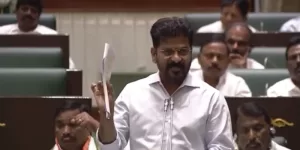Indian diplomacy is descending from the sublime to the absurd. Such wild swings signal
rank opportunism. These are extraordinary times when to be smart is equated as being
opportunistic.
Hardly a week passed since PM Modi received the Iranian Foreign Minister Amir-
Abdollahian in Delhi and expressed high hopes for India-Iran relationship. Now it
transpires that India also forms part of the Gang of Four led by US President Joe Biden to
“contain” Iran, from a new platform called I2U2 — the ‘I’ being India and Israel, and ‘U’
being US and UAE.
The I2U2 summit in mid-July between Biden, Israeli Prime Minister Bennett, Modi, and
Emirati President Mohammed bin Zayed is destined to be a signpost in the geopolitics of
West Asia. This new Quad first appeared on 18th October 2021 as an offspring of External
Affairs Minister Jaishankar’s 5-day trip to Israel when from Tel Aviv he pulled a rabbit out of
the hat, leaving the Indian public wonder what new grandstanding their impulsive minister
was indulging in.
Between October and July this year, the I2U2 is getting an upgrade from foreign minister
to prime minister/president level. On Tuesday, while announcing Biden’s first West Asian
tour as president in mid-July, Washington has made some effort to rationalise Biden’s
intentions in undertaking the planned visits to Israel and Saudi Arabia. A senior White
House official said Biden intends:
To demonstrate “the return of American leadership to bring countries together”;
To create “new frameworks that aim to harness unique American capabilities to
enable partners to work more closely together, which is essential to a more
secure, prosperous, and stable Middle East region over the long term”;
To build on the “resounding vote isolating Iran last week at the IAEA Board of
Governors in Vienna where 30 countries condemned Iran’s lack of compliance
with safeguard obligations” (where India, by the way, had abstained from
supporting the US move);
“To make sure we’re doing all we can to strengthen Israel’s security, prosperity,
and integration into the larger region, both now and over the longer term”;
To “focus on Israel’s increasing integration into the region” through new formats
other than Abraham Accords, such as the “entirely new grouping of partners…
what we call I2U2”!
So, that’s it. India will lend a hand to assist the US to refill the fizz that has gone out of the
Abraham Accords. The hope that more countries would join Abraham Accords is withering
away. Israel needs to be shown around to prospective suitors in its neighbourhood. I2U2
is, in essence, a dating agency. When it concerns Israel, the role of pandar comes
naturally to the US presidents. But why should India squander away its soft power?
The US prestige and influence in West Asia has suffered a severe jolt during the Biden
presidency. Not too long ago, Biden had called Saudi Arabia a “pariah” and pledged to
make a horrible example of it on account of its human rights record. But now the shoe is
on the other foot. Biden is craving for attention from Saudi Arabia. He had taken a second
vow not to have any dealings with the powerful Saudi Crown Prince Mohammed bin
Salman. But he is now beseeching the proud Prince for an audience. His recent phone
calls weren’t answered.
The White House official explained Biden’s U-turn this way: “we have important interests
interwoven with Saudi Arabia, and engagement is essential to protecting and advancing
those interests on behalf of the American people.” In reality, Biden is swallowing pride and
reviving the old matrix of US-Saudi relationship riveted on the petrodollar.
With poll rating falling abysmally low, Biden is desperate to tackle the rising inflation in the
US economy, and the soaring price of oil is fuelling public disaffection. Saudi Arabia can
help Biden salvage his standing.
However, it is the turn of the Saudis now to tell Americans there’s nothing like free lunch.
They want a written treaty to the effect that the US won’t ditch them when the crunch time
comes or if the Kingdom or the ruling family feels insecure. Put differently, they want the
Americans to act as their Praetorian guards as before.
In return, of course, Saudis will generate massive business for the US military-industrial
complex, recycle their petrodollar to strengthen the Western banking system and create
lucrative business for American companies — in short, help the beleaguered Western
economies to pursue their post-pandemic recovery that is getting derailed by the war in
Ukraine.
Indeed, the Saudis also have a rich history of lavishly greasing the palm of the American
elite in the administration, the Pentagon and the Congress. In a nutshell, Biden as a
seasoned operator in the Beltway knows which side of the bread is buttered.
But to rationalise his U-turn, an alibi is needed. So, Biden has decided to hoist “Iranian
threat” as the leitmotif of the revamped US-Saudi security alliance. All signs are that Biden
has acceded to the Saudi demand to scuttle the JCPOA and pile new sanctions against
Iran, although the negotiations in Vienna are in home stretch and an agreement is within
sight.
Biden’s West Asian agenda is completely US-centric, aimed at securing US business
interests and shoring up its regional influence. Israel, of course, is “holy cow”. Very soon
Biden will begin fund-raising for his re-election bid in 2024, and Jewish donors are a
generous lot.
However, the million dollar question remains: What has India got to do with Biden’s
agenda? There are real risks, for the subplot here is that Biden hopes to nix India’s plans
to revive its atrophied relationship with Iran. The recent visit of the Iranian foreign minister
to India would have set alarm bells ringing in Washington and Tel Aviv.
Biden has a game plan for leaders like Modi who have a tendency to disregard the US
diktat occasionally. Biden’s national security advisor Jake Sullivan spoke candidly just the
other day:
“We’re playing the long game here. We are investing in a relationship (with India) that we
are not going to judge by one issue even if that issue is quite consequential, but rather that
we are going to judge over the fullness of time, as we try to work to convergence on the
major strategic questions facing our two countries.
“On one of those questions — how to deal with the challenge posed by China — there’s
much more convergence today, and that is important to US foreign policy. On the question
of Russia, obviously, we have different historical perspectives, different muscle memories,
but we feel confident that the dialogue we have going with India right now will bear fruit
over time.”
Sullivan was discussing India’s time-tested relationship with Russia — how Washington
hopes to erode and dissolve it all in good time.
Plainly put, Americans estimate that Indians have no “staying power,” or “big picture.” They
probably estimate that the Indian government would grab the I2U2 platform to burnish its
international image. But if there is any sanity left in the Indian foreign policy establishment,
a subaltern role to serve US and Israeli interests cannot enhance India’s prestige in West
Asia where, as it is, Modi government is perceived as an Islamophobic regime backed by
religious fanatics.
In the life of individuals and nations alike, there are moments when one has to learn to say
“no.” This self-serving, cynical overture from 78-year old Biden is one such moment. That’s
why, despite zero chance of India turning down Biden’s invite, not to urge Modi to say
“Nyet” to I2U2 will be a serious lapse.
South Block is underestimating the gravity of its folly. India never ever got entangled in the
intra-regional issues in West Asia. It never acted as the surrogate of extra-regional
powers, either. Most important, it never sought the “containment” of any regional state.
That’s how it held its head high in the choppy waters of the Persian Gulf.
(M.K. Bhadrakumar is a former Indian diplomat. Courtesy: Indian Punchline,
Bhadrakumar’s blog.)




